Turnage A Buzz: First downtown Washington beehive installed on historic theater’s roof
Published 9:02 pm Monday, August 18, 2014
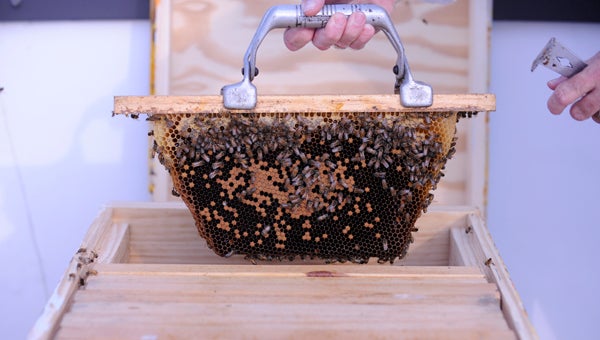
VAIL STEWART RUMLEY | DAILY NEWS
SWEET TOUCH: Mike Senn helps coax 40,000 three-band Italian honeybees to their new hive on the Turnage Theater roof on Sunday night.
The Turnage Theater has some new tenants and they look nothing like the staff of the Beaufort County Arts Council.
Sunday evening, representatives from the Beaufort County Beekeepers Association installed a hive of three-band Italian honeybees on the roof of the theater. The bees make their new home in a wooden beehive that does its artistic venue justice: a modified Tanzanian top-bar hive sporting an acrylic portrait of bees among flowers on top, and magnified honeycomb along the sides.
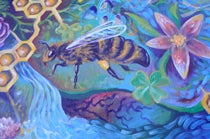
Bees are nature’s pollinators, as shown here in artist Mandy Peedin’s painting on the top of Turnage rooftop hive — the Beaufort County Beekeepers Association is planning to offer hives to new beekeepers both with, or without, Peedin’s artwork.
“I showed the hive to the North Carolina Beekeepers Association and they loved it,” said Mike Senn, a 30-year Washington beekeeping veteran and vice president of the local association.
Senn and Tom Garcia, president of the Beaufort County association, moved approximately 40,000 honeybees into the rooftop hive with very little fanfare and nary a sting. The box of bees was unloaded in the rear parking lot then hoisted by rope over the side wall of the theater’s rear roof. From there, it was only a matter of minutes before all the bees were safely ensconced in their new home, as Garcia and Senn gingerly lowered bars of bee-covered honeycomb into the new box.
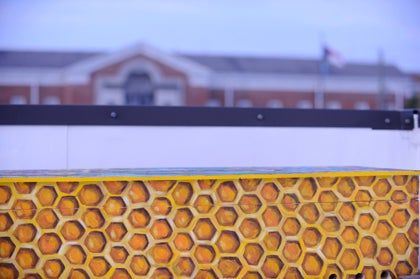
The honeybee hive atop the Turnage Theater sits beneath the outer wall of the roof — out of line of sight and well above any people in the area.
Garcia said since he first started his backyard beekeeping in Washington two years ago, it’s been a dream of his to install rooftop hives throughout the city as a way to promote awareness of the plight of the honeybee, as well as increase the local honeybee population. Honeybees are instrumental in the fertilization of agricultural crops, but colonies worldwide have been decimated in the last decade — the cause of which is unknown, but has been linked to parasites and the use of some pesticides on crops. That’s led to a two-year ban on pesticides containing neonicotinoid in the European Union. In the U.S., legislation has been proposed that directs the EPA to follow suit.
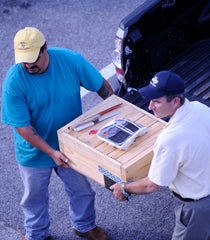
Garcia, left, and Senn, right, unload 40,000 three-band Italian honeybees in the parking lot of the Turnage Theater on Sunday before hoisting the bees by rope over the roof’s outer wall.
There is no ordinance regarding beekeeping in the City of Washington, but Garcia said he had made city officials aware of the installation of a hive on the Turnage roof. Garcia said no one will even know they’re there.
“There’s really no risk. (The hive) is low profile. It’s weighted, so it’s not going to be blown over. It’s out of the line of sight of people — the flight path is way overhead,” Garcia said.
Once the hive is established — which means between 60,000 to 100,000 bees, Senn said — the bee bounty — honey — will be featured in the Lane Gift Shop in the theater downstairs. Should all go well, BCAC honey sales should start in about a year; the profits of which will be split 50-50 by the BCAC and the beekeepers association.
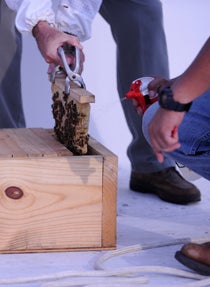
Veteran beekeeper Mike Senn, barehanded, gingerly moves a bar of honeycomb and its bees to the new hive in downtown Washington.
Garcia and Senn, who wore little protective gear during the bee move, said the public has nothing to fear from the bees.
“If bees were aggressive, would I be able to do this?” Senn asked, as he reached a hand down and appeared to pet the mass of bees with a finger. “They’re only aggressive if someone’s swatting them.”
Interest in beekeeping locally, and nationally, has risen of late. The Beaufort County Beekeepers Association, just a year old, has 30 paying members, and its April certified beekeepers course attracted 52 participants, 25 of whom went on to become certified beekeepers.
Garcia said another eight-hour course is planned for October.
Both Senn and Garcia hope that rooftop beehives will eventually become a statewide initiative, but would love to see more businesses and building owners step forward to help the cause by allowing a beehive to be installed on other local roofs.
“I’m hoping this is the first of many,” Garcia said.
For more information about the Beaufort County Beekeepers Association, visit www.facebook.com/BeauCoBeekers.
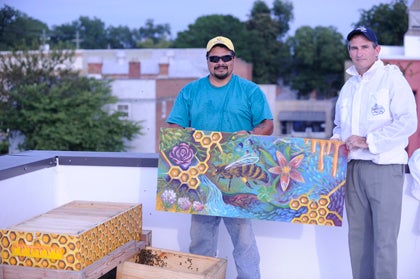
Beaufort County Beekeepers Association President Tom Garcia (left), and Senn, vice president of the organization, finish up the transfer of the bees to their new home and prepare to place the lid on the new hive.





